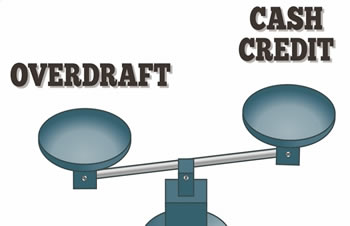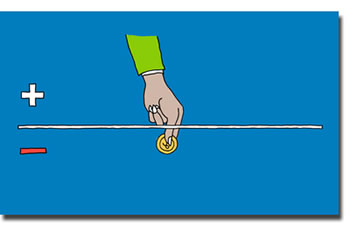Difference between Cash Credit and Overdraft
Key Difference: Cash Credit and Overdraft are types of credit that businesses can avail from a bank or similar institutions. The main difference between Cash Credit and Overdraft is that overdraft is extended on an existing bank account with the bank or lending institution, whereas cash credit is a completely separate facility that must be applied for individually.
 Cash Credit and Overdraft are two terms that anyone who has a bank account may have come across. The terms are mainly used in the context of business and business finance. Both are types of credit that businesses can avail from a bank or similar institutions.
Cash Credit and Overdraft are two terms that anyone who has a bank account may have come across. The terms are mainly used in the context of business and business finance. Both are types of credit that businesses can avail from a bank or similar institutions.
Cash Credit and Overdraft are types of cash loans meant to be used for a quick supply of cash when the business is running low. They are meant to be used for short durations and are hence termed as short-term cash loans.
The terms overdraft refers to when a person withdraws money from their bank account leading to the balance to go below zero. Another way to say this is when the bank balance is in negative. When this happens, the bank usually charges a fee. However, businesses may be able to avail this service if their bank allows it. The bank will usually set a limit to how much the account holder can over-withdraw. This limit is often decided on the basis of the business holder’s previous bank balances, fixed deposits, and other assets. The bank will then typically charge interest on the amount of money that has been withdrawn in overdraft.
Cash Credit, on the other hand, is something slightly different. It refers to a type of loan that the bank provides to the business or the business owner. Like nearly all loans the bank does ask for collateral in return, in case the person will not be able to pay back the loan. The collateral can be stock, raw materials, or other tangible assets. The limit of the cash credit is calculated on the basis of the business’s working capital. The cash credit is allotted primarily for the purchase of raw materials or current assets.
 This cash credit is usually held in a cash credit account, which is similar in nature to a current account. The account holder can withdraw the amount that he needs via the use of a check book. The interest would then be charged on the basis of the amount withdrawn. Once the person deposits the withdrawn amount, the interest will cease to be applicable, until the next time the owner withdraws the amount.
This cash credit is usually held in a cash credit account, which is similar in nature to a current account. The account holder can withdraw the amount that he needs via the use of a check book. The interest would then be charged on the basis of the amount withdrawn. Once the person deposits the withdrawn amount, the interest will cease to be applicable, until the next time the owner withdraws the amount.
The main difference between Cash Credit and Overdraft is that overdraft is extended on an existing bank account with the bank or lending institution, whereas cash credit is a completely separate facility that must be applied for individually.
Additionally, overdrafts are generally available for regular account holders, as well as for businesses, whereas cash credit is primarily for businesses and business holders. Also, overdrafts are intended for use once in a while or as per need, whereas cash credit is intended for use frequently and regularly.
Comparison between Cash Credit and Overdraft:
|
|
Cash Credit |
Overdraft |
|
Field |
Business and finance |
Business and finance |
|
Type |
Short-term cash loans |
Short-term cash loans |
|
Description |
Loan offered to businesses to continue running when funds are low |
Short term loam of cash when it is immediately required. |
|
Purpose |
For purchase of raw materials or current assets |
Not defined |
|
Limit |
Usually higher |
Usually lower |
|
Limit Calculation |
On the basis of the business’s working capital, as well as other tangible assets such as stock, raw materials, etc. |
On the basis of the business holder’s previous bank balances, fixed deposits, and other assets |
|
Interest |
Usually lower |
Usually higher |
|
For |
Businesses and business holders |
For individuals, as well as for businesses and business holders |
Reference: Wikipedia (Cash Credit and Overdraft), Investopedia, eFinanceManagement, Banking School, TaxAdda Image Courtesy: investopedia.com, pmjandhanyojana.co.in









Comments
Tax
Mon, 02/27/2017 - 09:40
Add new comment